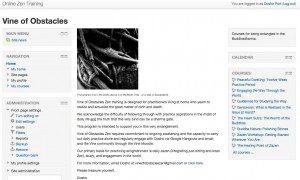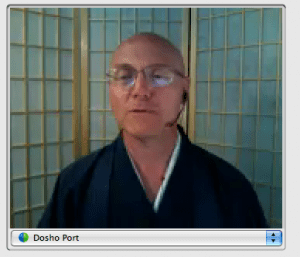
We’re in the middle of a twelve-week practice period in the Vine of Obstacles: Online Support for Zen Training and are having some conflict – a very good sign, imv, of practitioners digging in and taking this work personally. And then learning what needs to be dropped and how not to take it personally.
First, a little background.
Before the practice period begins, participants consider a personalized theme for their practice period, what we call their “one inescapable thing” and consider as well how they might work this theme in zazen, study, and engagement. I encourage putting the one inescapable thing as a question, e.g., “How can I practice wholeheartedly?” “How can practice be continuous?” “What is right speech?” “How can I practice with anger?”
Then during the practice period, the participants take time every Sunday to reflect on their past week, what they’ve learned, and plan their practice for the coming week.
This format has been very successful in supporting practitioners to practice in our online community, largely because Vine practitioners are touchingly transparent about their work. They report if they did what they planned to do, how often they really sat zazen, what they studied, and if how they met or stumbled at following through with their plan for engaging the world through practice and the real stuff, joys and sadness, that’s happening in their lives, including their issues with work, children, losses, falling down and getting back up.
There is a quality of intimacy on the Vine that is considerably greater than most in-person communities – a most unexpected result for an online community!
And sometimes practitioners wonder if all this sharing is really practice.
Recently, for example, a practitioner with years of Zen work in an in-person community raised the issue in one of our forums, saying, “I think zen practice is about something different from a worthiness projects, self improvement or psychotherapy. I’m a therapist, so I have nothing against therapy, but I wonder if people use Buddhism as a substitute for therapy. I wonder if something gets obscured when zen practice and psychotherapy get blurred together.”
Here’s part of my response: “As I see it, our practice enlightenment project is, of course, to focus on now, radically accepting ourselves and the 10,000 things. When we practice Buddhism to make ourselves okay, well, that’s okay … and in the heat of the zazen furnace, that view will surely melt away and we will dance a little jig of joy – perfect and complete from the beginning!
“After all, the buddhadharma is vast and wide. It includes kindness and anger, right and wrong speech, wholeheartedness/aspiration and half-assedness. And from the big heart of bodhisattva love, we can devote ourselves to carrying the myriad beings across, knowing all the while that this shore is the other shore and that there is truly no coming, no going – not as philosophy but as something we’ve personally verified.
“If we kick out our psychological selves from the zendo of our lives, we miss the chance to live congruently with ourselves, our friends and our neighbors. In addition, I’m afraid we might create a club devoted to spiritual by-passing. I’ve seen it and it ain’t pretty – a board-carrying community, 1/2 blind and whacking each other unknowingly.
“To pick up one inescapable thing, for some of us a psychological thing, and devote ourselves to engaging the world, is certainly the buddhadharma, is certainly Zen, a Zen informed by modernity and rooted in the deeply settled heart of the Soto school. As Dogen says in Bendowa, ‘The endeavor to negotiate the Way, as I teach now, consists in discerning all things in view of enlightenment, and putting such a unitive awareness into practice in the midst of the revaluated world.’”
The Vine of Obstacles is still pretty new, about 18 months along. The process of developing the courses for the study component (“Guidelines for Studying the Way,” “The Heart Sutra,” “Genjokoan,” “Buddha Nature,” “The Healing Point of Zazen,” and soon, “A Bodhisattva’s Four Methods of Guidance”) continues to be an energizing activity for me, pulling together various threads of my background and sharing the buddhadharma in a way that I hadn’t imagined possible just a few years ago.
And doing practice meetings with earnest students of the way from all over the world, from South Africa to Sweden to Alabama to Washington, is a lot of fun.
So I can report to you today, dear blog reader, that online practice can be authentic Zen. Thanks to the Vine community, I no longer have doubt about it.
Warm regards,
Dosho, aka, Low Tide











